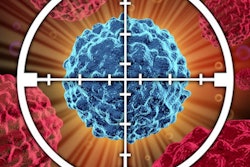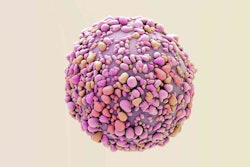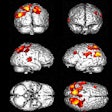Gallium-68 (Ga-68) fibroblast activation protein inhibitor (FAPI) PET/CT is a promising new method for imaging gastric cancer, according to a study published January 16 in the Journal of Cancer Research and Clinical Oncology.
The finding is from an analysis of 112 patients, with FAPI-PET scans revealing new findings in 24 patients after initial contrast-enhanced CT scans, noted a group led by Hongfeng Gou, MD, of Sichuan University in Sichuan, China.
“Our study showed that Ga-68 FAPI-PET/CT can detect more new findings, especially distant metastases, than CT,” the researchers wrote.
Gastric cancer is the fifth most common cancer and the fourth leading cause of cancer-related death worldwide. Accurate staging -- the process of determining how much cancer is in the body and if it has spread -- is crucial for treatment.
While contrast-enhanced CT and endoscopic ultrasound are widely used for the clinical staging of gastric cancers, they have low sensitivity for detecting lymph nodes and peritoneal metastases, the authors explained. Thus, the group explored the impact of additional Ga-68 FAPI-PET/CT scans following CT, as well as whether the method changed how patients were treated.
The researchers identified 112 patients (38 females and 74 males between 24 and 83 years old) with gastric cancers who underwent contrast-enhanced CT followed by Ga-68 FAPI-PET/CT within 30 days. Eighty-four (75%) patients underwent Ga-68 FAPI-PET/CT scans at the time of initial diagnosis, while 28 (25%) underwent scans in the postoperative setting to investigate suspected recurrence.
Two certified nuclear medicine physicians with 17 and 5 years of experience independently analyzed the Ga-68 FAPI-PET/CT scans, with primary tumors and metastatic lesions confirmed as positive based on the intensity of the Ga-68 FAPI radiotracer signal.
 Representative case 1. T4a staging of primary lesions (long arrow) and regional node-positive (short arrow) on contrast-enhanced CT (a). A normal-size (7 mm in short axis) node at the para-aortic region on contrast-enhanced CT (arrowhead, b). The primary tumor and regional nodes, showing a maximum standardized uptake value (SUVmax) of 13.5 and 12.4 respectively, with radiotracer accumulation on PET (c). The para-aortic node, with an SUVmax of 11.6, indicating tracer accumulation on PET (arrowhead, d). The maximum projection image of PET (e). f, g,h show the results of another Ga-68 FAPI- PET/CT scan after six cycles of immunotherapy. The PET maximum projection image (f), axial PET (g), and CT (h) at the level of the para-aortic node, with no identifiable tumor lesions. Images available for republishing under Creative Commons license (CC BY 4.0 DEED, Attribution 4.0 International) and courtesy of the Journal of Cancer Research and Clinical Oncology.
Representative case 1. T4a staging of primary lesions (long arrow) and regional node-positive (short arrow) on contrast-enhanced CT (a). A normal-size (7 mm in short axis) node at the para-aortic region on contrast-enhanced CT (arrowhead, b). The primary tumor and regional nodes, showing a maximum standardized uptake value (SUVmax) of 13.5 and 12.4 respectively, with radiotracer accumulation on PET (c). The para-aortic node, with an SUVmax of 11.6, indicating tracer accumulation on PET (arrowhead, d). The maximum projection image of PET (e). f, g,h show the results of another Ga-68 FAPI- PET/CT scan after six cycles of immunotherapy. The PET maximum projection image (f), axial PET (g), and CT (h) at the level of the para-aortic node, with no identifiable tumor lesions. Images available for republishing under Creative Commons license (CC BY 4.0 DEED, Attribution 4.0 International) and courtesy of the Journal of Cancer Research and Clinical Oncology.
Compared with CT, 29 new findings in 24 patients were identified on Ga-68 FAPI-PET/CT. Among the 112 patients, 21 patients (18.8%) experienced changes in stage or postoperative recurrence. Among the initial staging group, 14 had stage changes, with 10 being upstaged and four being downstaged, the researchers reported. In the group scanned for detection of postoperative recurrence, seven more patients were diagnosed with tumor recurrence.
Finally, new findings on Ga-68 FAPI-PET/CT led to treatment change in 20 of the 112 (17.9%) patients, with 19 of these deemed as major changes and one deemed minor, according to the findings.
“Ga-68 FAPI-PET/CT is valuable for precise staging and detection of postoperative recurrence of gastric cancers, and has the potential to influence management,” the researchers wrote.
Ultimately, future large-scale prospective studies will be needed to confirm the results, the authors wrote. Moreover, the objective of this study was to explore the supplementary value of Ga-68 FAPI-PET/CT rather than comparing the method with CT, they noted.
“We plan to conduct research in this area in the future,” the researchers concluded.
The full study is available here.




















